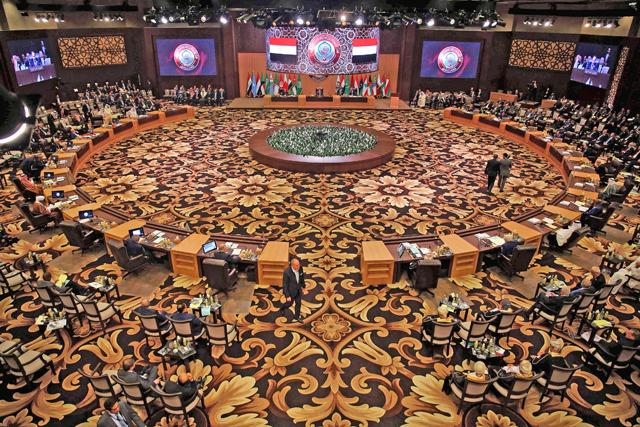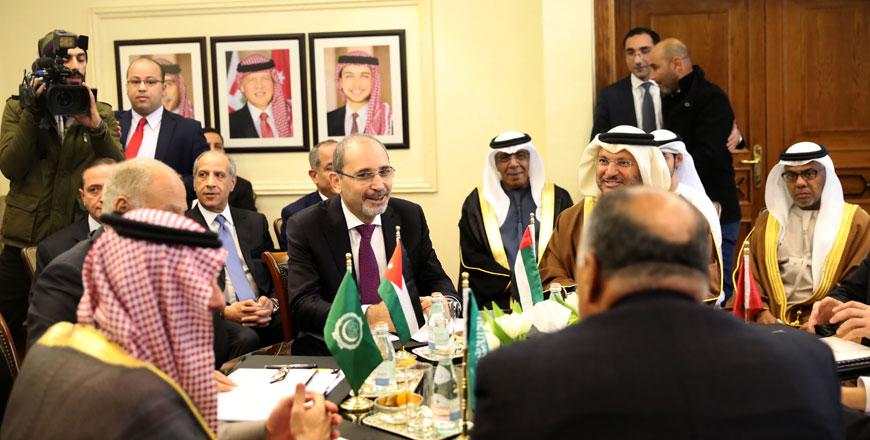You are here
Amman Declaration warns against unilateral Israeli measures
By Mohammad Ghazal - Mar 30,2017 - Last updated at Mar 30,2017

A general view shows the Arab League summit at the Dead Sea on Wednesday (AFP photo)
DEAD SEA — Arab leaders on Wednesday urged all countries not to relocate their embassies in Israel from Tel Aviv to Jerusalem or even recognise Jerusalem as the capital of Israel.
The Arab leaders also warned against unilateral measures by Israel that seek to alter the situation in Jerusalem and impose new realities, according to the Amman Declaration announced at the conclusion of the 28th Arab summit.
"We sent a message of peace to the world. We want peace and we had an honest discussion with the US envoy who attended the summit and that we said we want peace and we want to work with the US administration to achieve peace, and we look forward to intensifying talks with them to find a mechanism to move forward to attain peace," Minister of Foreign Affairs Ayman Safadi said at a press conference following the announcement of the Amman Declaration.
"We want peace that fulfils the legitimate rights of the Palestinians," said Safadi, adding that the summit was very successful but "we do not expect to overcome the challenges overnight".
Arab League Secretary General Ahmad Aboul Gheit said: "There is international momentum at this stage. There is a strong tendency towards a fair settlement."
"There are indications that there will be something at the end of April," said Aboul Gheit.
His Majesty King Abdullah, Palestinian President Mahmoud Abbas and Egyptian President Abdel Fattah Al Sisi will visit the US for talks with President Donald Trump next month.
The call on the countries not to relocate their embassies in Israel sends a clear message to the US administration as Trump and his aides renewed discussions that seriously consider the relocation of the US embassy from Tel Aviv to Jerusalem.
Israel has been pressing the US to relocate its embassy to Jerusalem for decades, an issue that Jordan and Arab states repeatedly objected to, warning of possible dangerous consequences.
According to Palestinian officials at the summit, such a move would jeopardise peacemaking efforts, especially since it was agreed under international resolutions to leave final status issues including East Jerusalem, which the Palestinians envisage as the capital of their future state, for final direct negotiations.
Arab leaders called on the international community to enforce UN Resolution 2334 of 2016, which states that Israeli settlements have no legal validity and constitute a flagrant violation of the international law.
The resolution reiterates the Security Council's demand that Israel immediately and completely cease all settlement activities in the occupied Palestinian territory, including East Jerusalem. It underlined that it would not recognise any changes to the June 4, 1967 lines, including with regard to Jerusalem, other than those agreed by the two sides through negotiations.
They said the Israeli settlement activities represent a stark violation of international law and a key obstacle to peace.
The Arab leaders stressed their continued efforts to relaunch serious and effective peace talks between the Palestinians and the Israelis.
Arab leaders stressed the Arab identity of occupied East Jerusalem, which they said is the capital of the Palestinian state.
The Arab heads of state renewed their commitment to the 2002 Arab peace initiative and voiced support for the Palestinians and their right to statehood.
They also called for the release of all prisoners and resolving the issue of refugees in line with international resolutions.
On Syria, they called for a political solution that ends the conflict in the country and preserves its unity and territorial integrity.
Arab leaders called on Turkey to withdraw its forces from Iraqi territories as their presence is a violation of Iraq's sovereignty and a threat to pan-Arab security.
They also voiced support for Iraq's efforts to uproot terrorism and eradicate the Daesh terror group.
In the declaration, Arab leaders condemned external interference in their internal affairs.
They also condemned all terrorist acts and said that terrorism is not linked to any religion, while stressing the need for a comprehensive strategy to counter terrorism.
The Arab leaders decided to task a ministerial committee to set mechanisms to assist Syria's neighbouring countries that host refugee.
The Arab leaders also voiced their support to the legitimate government in Yemen and welcomed the holding of an Arab-European summit for cooperation.
Related Articles
AMMAN — The micro Arab ministerial team tasked with following up on the repercussions of the US decision recognising Jerusalem as the capita
TUNIS — Arab leaders, the UN and the EU on Sunday renewed their commitment to the two-state solution as the sole answer to ending the Palest
AMMAN — Minister of Foreign Affairs Ayman Safadi announced on Saturday that Jordan would host an "extraordinary" Arab summit as the chair of













